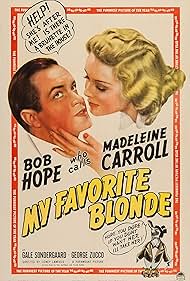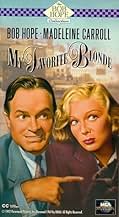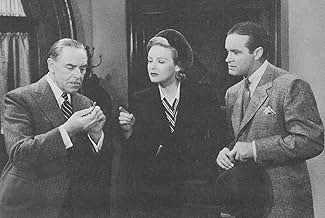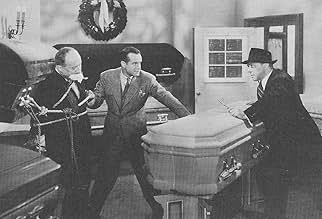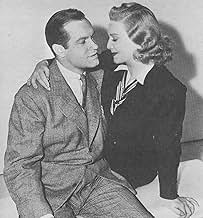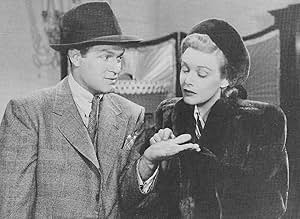IMDb RATING
7.0/10
1.7K
YOUR RATING
Karen Bentley, an English secret agent, links up with Larry Haines and his star penguin Percy in an attempt to outwit German spies.Karen Bentley, an English secret agent, links up with Larry Haines and his star penguin Percy in an attempt to outwit German spies.Karen Bentley, an English secret agent, links up with Larry Haines and his star penguin Percy in an attempt to outwit German spies.
- Awards
- 2 wins total
Featured reviews
This early wartime Bob Hope comedy is one of his best, and is from a time in the comedian's career when his movies hadn't become routine, and when his was a bit less buffoonish and incompetent than in his later efforts. Aided by the lovely Madeline Carroll, Bob is up to his neck in Nazi spies in this satire of Hitchcock-type thrillers, and the "straight" scenes are menacing enough to give the story real bite. The supporting cast is lively and eclectic, and includes George Zucco and Dooley Wilson. Gale Sondergaard is on hand, and as was so often the case in the forties she seems to be doing a send-up of Judith Anderson's malevolent Mrs. Danvers from Rebecca. She does it very well, but one wonders why this beautiful woman was never cast as a female lead. My Favorite Blonde is fast-paced and has some good lines from Hope regulars Frank Butler and Don Hartman. Watching this movie always makes me wonder why Hope's later films, which also tend to be spoofs, are so sloppy, since he is so much funnier and more effective in early vehicles like this one, which are played at least half-straight, and far better for it.
A good spy thriller: British agent Madeleine Carroll attempts to transport a scorpion-shaped brooch that conceals microfilm holding key military information. She is chased by Nazi spies led by George Zucco and Gale Sondergaard. Two agents are killed in the first ten minutes.
Cut to Bob Hope—or rather, his penguin. Hope and penguin are Haines and Percy, a sort of vaudeville act. The penguin has just gotten the call from Hollywood; Hope would like to think that he is the real star. Paths cross when Carroll, hoping to shake the Nazis from her trail, ducks into Hope's dressing room. And the fun begins.
Needing cover and hoping to conceal her true identity, Madeleine feigns romantic interest in Bob, and plays it up good. He is surprised and mystified by her attention—and soon by attention from Zucco and gang, who want the scorpion and know he is somehow involved. The scene where spies surround and stare him down on the train's club car is classic Hope, as his nervousness starts slowly but gradually bubbles over.
The scenes between Hope and Carroll are even better she plays it fairly straight and he plays it goofy and the interplay just works like a charm. One especially funny scene in the train compartment: having pressed up close to him with a kiss and retrieved the brooch from his lapel, she stands up and moves away; not having a clue, Hope grabs her and tries to kiss her again—and she slaps him indignantly. "Take your hands off me!" she snaps. Poor Bob.
The dialog is bright and funny throughout, with Hope naturally getting the best lines, including some vintage Hope gems: "I've given up kissing strange women." "What made you stop?" "Strange women."
Zucco and Sondergaard have only small roles, but they sure can play the baddies. Talk about sinister!
However, Bob and Madeleine are pretty much the whole show here. The relationship between the two leads develops nicely—we have a pretty good idea how it's going to turn out, but it grows at a careful pace, not too fast or too slow or too sudden.
Top notch and full of great laughs.
Cut to Bob Hope—or rather, his penguin. Hope and penguin are Haines and Percy, a sort of vaudeville act. The penguin has just gotten the call from Hollywood; Hope would like to think that he is the real star. Paths cross when Carroll, hoping to shake the Nazis from her trail, ducks into Hope's dressing room. And the fun begins.
Needing cover and hoping to conceal her true identity, Madeleine feigns romantic interest in Bob, and plays it up good. He is surprised and mystified by her attention—and soon by attention from Zucco and gang, who want the scorpion and know he is somehow involved. The scene where spies surround and stare him down on the train's club car is classic Hope, as his nervousness starts slowly but gradually bubbles over.
The scenes between Hope and Carroll are even better she plays it fairly straight and he plays it goofy and the interplay just works like a charm. One especially funny scene in the train compartment: having pressed up close to him with a kiss and retrieved the brooch from his lapel, she stands up and moves away; not having a clue, Hope grabs her and tries to kiss her again—and she slaps him indignantly. "Take your hands off me!" she snaps. Poor Bob.
The dialog is bright and funny throughout, with Hope naturally getting the best lines, including some vintage Hope gems: "I've given up kissing strange women." "What made you stop?" "Strange women."
Zucco and Sondergaard have only small roles, but they sure can play the baddies. Talk about sinister!
However, Bob and Madeleine are pretty much the whole show here. The relationship between the two leads develops nicely—we have a pretty good idea how it's going to turn out, but it grows at a careful pace, not too fast or too slow or too sudden.
Top notch and full of great laughs.
Larry Haines is a vaudeville entertainer who's act involves a roller skating penguin. He becomes entangled in a war time plot when British agent Karen Bentley is forced to use him as cover to help her get American bomber plans into the right hands and keep it safe from the Nazis.
It's a shame that this film has eluded me until the great man himself has actually died, but it was to mark his passing that this film got screened on television recently. The plot is largely meaningless but is good natured and involving enough to keep the film moving along as a thriller of sorts. However it is really no more than a nail from which to hang a series of quips, one liners and wise cracks from Bob Hope. These are scripted well and the film manages to be very funny even more than half a century later.
Hope is at his best here as the cowardly, self-depreciating performer who is sucked into the plot with his trademark unwillingness. His lines are still sharp and his delivery here is as good as some of his best work. Madeline Carroll was never going to be able to share the limelight with Hope given that she has to carry the plot side of the film, however she does really well and has some laughs herself. The nazis fail to make a significant mark in the film and I struggle to remember them other than stooges even a short time after watching the film.
Regardless of this, the film should and will be enjoyed for it's main selling point the wise cracking comedy of Bob Hope. This film seems to be forgotten against some of his other works but it is a fine example of the wisecracks, jokes and delivery that made Bob Hope famous years after he left show business and will keep him famous for many more years yet.
It's a shame that this film has eluded me until the great man himself has actually died, but it was to mark his passing that this film got screened on television recently. The plot is largely meaningless but is good natured and involving enough to keep the film moving along as a thriller of sorts. However it is really no more than a nail from which to hang a series of quips, one liners and wise cracks from Bob Hope. These are scripted well and the film manages to be very funny even more than half a century later.
Hope is at his best here as the cowardly, self-depreciating performer who is sucked into the plot with his trademark unwillingness. His lines are still sharp and his delivery here is as good as some of his best work. Madeline Carroll was never going to be able to share the limelight with Hope given that she has to carry the plot side of the film, however she does really well and has some laughs herself. The nazis fail to make a significant mark in the film and I struggle to remember them other than stooges even a short time after watching the film.
Regardless of this, the film should and will be enjoyed for it's main selling point the wise cracking comedy of Bob Hope. This film seems to be forgotten against some of his other works but it is a fine example of the wisecracks, jokes and delivery that made Bob Hope famous years after he left show business and will keep him famous for many more years yet.
I can't believe no one has reviewed this film until now. The teaming of Bob Hope and Madeleine Carroll in "My Favorite Blonde" is comic heaven. Madeleine Carroll shows a flair for comedy she was rarely allowed to display in her films.
"My Favorite Blonde" is funny, fast, and sharp in the banter between Hope and Carroll. Check out the scene where they get out of what appears to be certain capture: the most hilarious scene in the film. A fine supporting cast of Paramount contractees make this one of Bob Hope's best constructed comedies. It's plotting and editing make this even more of a road picture than the "Road" pictures, a precursor to "Romancing The Stone".
"My Favorite Blonde" seamlessly shows the mixing of '30's romantic comedy with World War II plots, something that would soon become obsolete as the war dragged on. Catch it whenever you can!
"My Favorite Blonde" is funny, fast, and sharp in the banter between Hope and Carroll. Check out the scene where they get out of what appears to be certain capture: the most hilarious scene in the film. A fine supporting cast of Paramount contractees make this one of Bob Hope's best constructed comedies. It's plotting and editing make this even more of a road picture than the "Road" pictures, a precursor to "Romancing The Stone".
"My Favorite Blonde" seamlessly shows the mixing of '30's romantic comedy with World War II plots, something that would soon become obsolete as the war dragged on. Catch it whenever you can!
My Favorite Blonde is not just one of Hope's very best films, but an excellent introduction for new fans. Hope's usual roles were as a vaudevillian or radio comedian who finds himself having to reluctantly participate in some dangerous intrigue which is way over his head, and this movie shows the formula at its cleanest and most smoothly executed. Madeleine Carroll plays a British agent delivering a coded message who has run afoul of Nazis operating in the U.S., and Hope, a ne'er do well road company performer who does an act with a penguin, meets her on a train and bravely (well, sort of bravely) pitches in to keep her safe. The cloak and dagger nonsense on the train is a deft nod to Carroll's star-making turn in The 39 Steps, and this movie has much of that earlier film's energy. Carroll and Hope banter amusingly as they are chased across half of the U.S. The bright dialogue is the film's best feature and Hope's reluctant hero persona, introduced in The Cat and The Canary and Ghost Breakers, is a fully polished comic gem at the the film's center. The look of the film is very 'film noir' with looming shadows and danger on staircases and other now-familiar devices, but it still comes off as fresh entertainment even now. This one movie alone was enough to convince me that Hope is one of the great comic actors in all of movie history and this is an excellent showcase of what he could do. Also a must see for fans of the deliciously sinister Gale Sondergaard, here at something near her best.
Storyline
Did you know
- TriviaBing Crosby: as a man outside the union hall.
- GoofsWhen the penguin roller skates down the ramp in the stage act, wires are visible on the skates.
- Quotes
Larry Haines: "Is that your real hair or did you scalp an angel?"
- Crazy creditsThe opening title cards read: BOB HOPE who calls MADELEINE CARROLL "MY FAVORITE BLONDE"
- SoundtracksSobre las Olas (Over the Waves)
(1887)
Written by Juventino Rosas
Played during the Haines and Percy vaudeville act
Reprised for subsequent acts
- How long is My Favorite Blonde?Powered by Alexa
Details
- Runtime1 hour 18 minutes
- Color
- Aspect ratio
- 1.37 : 1
Contribute to this page
Suggest an edit or add missing content

